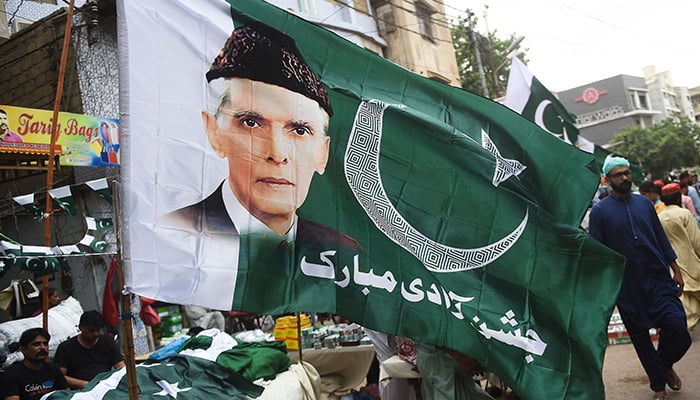By Muhammad Junaid
As Pakistan commemorates 76 years of its sovereignty and marks the milestone of half a century since the enactment of its Constitution, it is essential to scrutinize the current landscape through the prism of Mohammad Ali Jinnah’s visionary perspective for the nation. Jinnah possessed an extraordinary clarity regarding state matters, firmly placing the authority to alter administrations and their policies within the hands of the voting public.
In an address to military personnel in Quetta back in 1948, he emphatically emphasized, “The source of executive authority flows from the head of the government… Consequently, any directives or instructions that may reach you must be sanctioned by the executive head.”
Going back to August 11, 1947, the founder eloquently outlined fundamental principles during an address to the constituent assembly. These principles championed inclusivity, impartial governance, adherence to the rule of law, protection of religious freedom, and the pursuit of social equality.
The architects of the nation envisioned a progressive, thriving welfare state founded upon harmony and justice, bolstered by unequivocal civil supremacy. Yet, as the decades have unfolded, what materialized has diverged drastically from their aspirations. This juncture prompts us to ponder: is the concept of ‘Jinnah’s Pakistan’ slowly dissolving into the realm of myth?
Many of the challenges and dilemmas we grapple with today are largely of our own making. One significant instance is the reinterpretation of Jinnah’s identity—from a modernist figure to an orthodox representation—tailored to conform to prevailing narratives, thereby amplifying the influence of religious authorities and the military in shaping state policies.
Furthermore, the relentless transgressions against the Constitution have left behind a subtle imprint of what was meant to be a robust democratic ethos. Frequent military regimes arrested the natural flow of political evolution. In truth, these actions have contaminated political entities, which now, more often than not, collaborate with unelected elements in a bid to seize authority.
The military held dominion over Pakistan for a span of three decades, effectively orchestrating ‘selected’ regimes. A recent manifestation of this was witnessed through the hybrid model of governance under the PTI’s leadership, which met with resounding failure, much like its predecessors.
This was subsequently replaced by an utter relinquishment of collective political terrain, paving the way for a coalition led by PML-N. Lastly, the surging wave of extremism morphed Pakistan into a breeding ground for militancy.
Granted, there exists no enchanting panacea, yet curbing cronyism, combating corruption, and deterring intervention constitute prudent starting points. Redemption rests in reviving Jinnah’s vision through the application of the rule of law, bolstered by investments in education, healthcare, welfare, and the empowerment of the populace in a system of meritocracy. The act of allowing non-political entities to seize control or derail the constitutional framework, capitulating to religious hardliners, stands in stark violation of the ideals that held profound significance for the Quaid-e-Azam.
The arduous journey towards reinstating a truly democratic culture requires a concerted effort to reclaim the essence of the Constitution, rejuvenating the spirit of governance. It demands a departure from historical patterns that have hindered progress and stifled the flourishing of genuine democratic institutions. The pivotal aspiration lies in steering the nation towards a trajectory of inclusive growth, socioeconomic development, and the supremacy of democratic principles. This entails vigilant protection of the Constitution from subversion, ensuring that the nation remains steadfast in upholding the values that the founder of the nation ardently championed.
Subscribe our website for latest updates:
https://republicpolicy.com/shop/
Read More
















